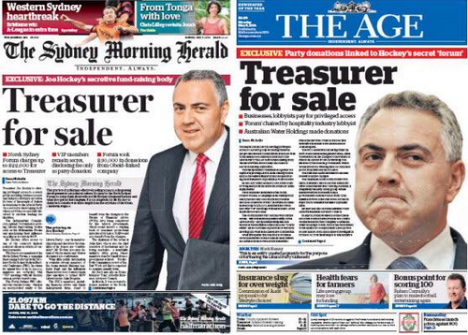Press watchdog to establish working group to push for reform following Hockey verdict
The Australian Press Council (APC) are proposing to lobby for reforms to defamation laws in the wake of Joe Hockey’s action against Fairfax.
Chairman David Weisbrot today told Mumbrella “substantial changes” to the defamation law are needed after Fairfax Media was yesterday ordered to pay 15 per cent of the Treasurer’s legal fees, with the print/online watchdog saying it is planning to form a task group to prepare a case for changes to defamation laws.
“We are proposing to get a group together to take a proposal to parliament calling for substantial changes to defamation laws,” said Weisbrot. Hockey was last month awarded $200,000 in damages for the headlines used in a poster and on Twitter “Treasurer for sale”, which failed to contain the full context of the story, however the court ruled that the substance of the actual news articles when viewed in context was not defamatory, leading to yesterday’s partial costs decision.
Both sides are estimated to have incurred more than $1m in legal bills, with legal experts saying neither side can claim to have come out on top.
Weisbrot said: “It doesn’t alter my view that defamation has a chilling effect of freedom of reporting and freedom of the press.
“Editors have got to be on alert before deciding how they will promote an article but will anyone form a view on the national treasurer based on a few words on a poster?
“A change in the law is needed to take a more contextual view on the wider story.”

The judge last month ruled the phrase ‘Treasurer for sale’ as a headline was acceptable in context with the article, but was defamatory on a poster and in tweets
The APC proposal will be for legal experts and media professionals to analyse best practices in defamation law from around the world, and develop ideas for reform that can be presented to both state and national governments.
Academic Michael Fraser, director of the Communications Law Centre, agreed the defamation laws need reform, particularly to deal with new forms of media.
“The fundamental thing is people have to be aware tweeting is not private, its public, so laws such as the law of defamation apply,” said Fraser.
“In this environment, and the challenge for the legal system will be how the law applies to the new technology and how consumers use that media.
“Some people believe those laws should not apply online, but they should. Our established legal system will apply, but it’s a matter of how it will apply.”
Until amendments are made, Fraser said the Hockey verdict should act as a warning for how editors repurpose news across various new media channels, such as Twitter.
“They [editors] have got to look at how the headlines themselves are used and make a separate judgment on that,” he said.
“It has always been the case with a poster outside the newsagents, but the question now is how does that apply to a Tweet with a link to the article?”
Journalism academic Margaret Simons said she didn’t expect the case to impact on the “core relationship” between journalists and politicians, but added: “It has underlined how undesirable it is for public figures to sue and call on the laws of defamation.
“Although defamation law is not fully keeping up with the times, it does show journalists and lawyers will have to think about how they will prepare stories and promote them on Twitter,” said Simons, who director of the Centre for Advancing Journalism, at the University of Melbourne.
Kevin Bradford





horse ….. stable door …….bolted !
User ID not verified.
I dont think the decision is such a big dea in the context of existing lawl. Just make sure your tweets and headlines arent defamatory. Hockey is no political Robinson Crusoe in taking scuh action as Neville Wran and Bob Hawke used to boast of their successes in the field. In the broader picture a defamation law reform should give a US style result which makes it much harder for public figures to take such action.
User ID not verified.